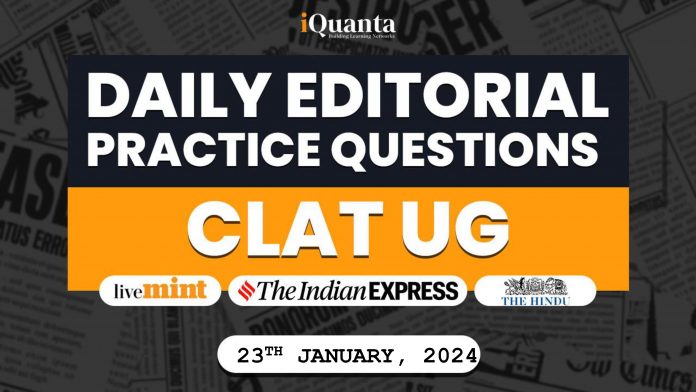Passage 1
Drawing strength from the diplomatic relations between India and Nigeria that have “existed for a very long time”, External Affairs Minister S. Jaishankar on January 22 said the two nations have agreed to strengthen people-to-people exchanges, energy, mobility and a slew of other sectors.
Mr. Jaishankar co-chaired the 6th Joint Commission Meeting between India and Nigeria at Abuja along with his counterpart Yusuf Tuggar also discussed opportunities in the sectors of power, renewables, transport, healthcare, fintech, agriculture and security between the two countries.
“Co-chaired the 6th Joint Commission Meeting along with FM @YusufTuggar. Noted the expansion of our economic cooperation, especially trade and investment. Discussed new opportunities in energy, power, renewables, transport, healthcare, fintech, agriculture and security,” Mr. Jaishankar said in a post on X.
Source – https://www.thehindu.com/news/national/
Get CLAT 2025 Coaching!

Passage 2
On January 1, Pakistan’s caretaker prime minister, Anwaar-ul-Haq Kakar, lost his cool at a news conference in Islamabad. When asked about the Baloch people who had been protesting in the Pakistani capital, demanding government action on enforced disappearances and extrajudicial killings, Kakar became visibly angry.
He called those demonstrating “relatives of those fighting against the state” and their supporters “advocates of terrorists in Balochistan”. His tirade aimed to delegitimise the Baloch protestors and justify the violence the Islamabad police had unleashed against them.
The approach of the caretaker prime minister, himself a Pashtun hailing from Balochistan, underlines the main issue with government policy towards the Baloch people. For decades, the civilian and military rulers of Pakistan have presented the Baloch issue as a security matter instead of looking into the community’s grievances and demands.
Source- https://www.aljazeera.com/opinions/




